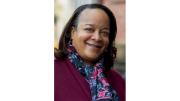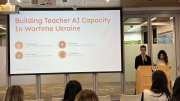Next fall, as K-12 schoolchildren throughout the country resume full-time classes, however transformed by the coronavirus, some of their future teachers, principals, and superintendents will find their education transformed, too. In the 2021-2022 academic year, the Harvard Graduate School of Education (HGSE) will debut the new curriculum for its Ed.M. program (by far its largest in enrollment). This wholesale rethinking aims for the first time to equip educators with a common core of knowledge fundamental to the varying responsibilities they may assume in a rapidly changing sector that remains essential to any society’s success.
As the U.S. school population becomes increasingly diverse, and disparities among students and their education systems widen (as the pandemic so painfully demonstrated), HGSE’s timing seems especially fortuitous. Former dean James E. Ryan, now president of the University of Virginia, began a discussion on reshaping the master’s curriculum to incorporate elements that all education professionals should know. Before Ryan left in 2018, he and academic dean Nonie Lesaux wrote that the faculty had voted to approve a “new framework” for the Ed.M., aimed at “elevat[ing] the status of the education profession by defining its key aspects, including core knowledge and skills that all educators should have.”
That implied both an aspiration to professionalize the training—much as a J.D. or an M.B.A. imparts command of the basics of law and business—and the belief that HGSE’s scholar-teachers could agree on those foundations of educational practice. The latter promised to be a major undertaking, given the school’s 13 separate Ed.M. tracks (from arts in education to international education policy and technology and innovation) and its single-year course of study. But when Bridget Terry Long succeeded Ryan as dean, she was prepared to follow through.
Long had joined the faculty in 2000, and served as academic dean from 2013 to 2017. The school had recently introduced a new doctoral program in education leadership (see harvardmag.com/newleadershipdegree-09) and subsequently overhauled its Ph.D. program—the senior practice and research elements, respectively, of its educational offerings. She became dean, she said, at a time when people are “desperate to improve education, address achievement gaps, and make better policy” (see “Educating Educators,” July-August 2019, page 25). In a conversation this March, she said revising the Ed.M. required drawing on the faculty’s research prowess, and soliciting insights from alumni practitioners and HGSE students about the urgent needs in the field, so the program could be restructured to map “our work to the core domains in education.”
The new Ed.M., she continued, begins with a question: “What is distinctive about education?” However practiced—in classrooms, administration, policymaking, or applying technology to learning—education proceeds from an understanding of how humans develop and learn. Thus, the first of four new Foundations courses for all students is called, simply, “How People Learn.” The second is “Evidence,” intended to make educators discerning consumers of research in the field, so they can follow debates and apply discoveries to their practice in schools and elsewhere. “Leading Change” is an immersion in organizational dynamics, within the particularly complex, multi-constituent context of schools, districts, nonprofits, universities, and governments. And “Equity and Opportunity” focuses on a subject that not only “motivates so many of our students and faculty,” Long said, but provides historical context so newly trained educators can understand how current differences among students, communities, and school systems arose (by race, gender, class, sexual orientation, and citizenship status)—the better to improve performance, and overcome glaring gaps in attainment.
Making these subjects requirements, Long said, signals their importance to students training for a twenty-first-century education career. Making them work within the one-year Ed.M. has been a whole other challenge. Each course has been piloted, Long said. “How People Learn,” created in an online format, has been run three times. In a conversation, its co-leader, Matthew L. Miller, associate dean for learning and teaching, described its evolution toward diverse modules, cases, and a mixture of live instruction and asynchronous materials. It is scheduled to be offered to the entering class with a couple of starting dates this June and July. In August, the new students will take “Evidence,” to prepare for their coming assignments, and, Long said, begin to grapple with the contents of “Equity and Opportunity,” which will continue, with increasing levels of sophistication and intensity, throughout the year. HGSE also uses January for wintersession teaching, and will extend instruction into May, in the weeks after the end of the semester and before Commencement. In all, said Lesaux, the four Foundations make up about 30 percent of students’ credits.
The rest of their work will be more specialized. Students will now enroll in a “Program” in which to develop expertise during their HGSE year:
• education leadership, organizations, and entrepreneurship;
• education policy and analysis;
• human development and education;
• learning design, innovation, and technology; or
• teaching and teacher leadership.
Each will have at least one core course, and a map for students to related courses within HGSE’s broader offerings. To date, Lesaux said, applicant interest has been fairly even among the fields. Finally, the new curriculum offers optional “Concentrations”: areas like arts and learning, early childhood, global and international education, and higher education. “Applicants really understand the model,” she said: a choice of required major and optional minor fields, much like the arts and sciences backgrounds many of them experienced as undergraduates.
Taken together, the Program and Concentration components map approximately on to the former, separate Ed.M. tracks, she noted—but the curriculum now reflects an intentional path through rigorous educational training, agreed to by the faculty as a whole, based on deliberation about what professionals need to know to begin their practice upon graduation. By contrast, the previous baker’s-dozen degrees arose over time from separate areas of faculty interest; they thus ran the risk of underemphasizing fundamental knowledge, and leaving graduates inadequately prepared for the ensuing decades of change certain to come in education.
As they prepare to launch the retooled Ed.M., Lesaux and Miller are already thinking about how to evaluate it and keep it vital. Lesaux said a basic sign of success would be “ongoing faculty enthusiasm about plugging into a core curriculum,” as demonstrated by the clinical and research professors’ teaching—and their evaluation of new colleagues when HGSE makes future appointments. Miller hopes to see evidence that employers and organizations benefit from the skills graduates acquire: given the professional nature of their training, he said, the criterion of success is “that students feel successful, are successful, and are judged successful” as educators.
Of the work to date, Long said, “I’m incredibly impressed with how much agreement we’ve come to as a faculty.” When she has discussed the Foundation elements with peers at other schools, she said, they have immediately agreed that HGSE has focused on the right subjects. She senses early validation that the degree, as now conceived, will “clearly define for the field what our graduates will get and know when they leave,” making the value of an HGSE education amply clear. Given parents’ and society’s hopes for children’s education—and concerns and disappointments about the education many of them are receiving now—that is no small thing.
That said, it is a sign of the times that the new Ed.M. has emerged during the pandemic. The admissions cycle for the inaugural entering class overlapped the winter height of COVID-19 infections, when no one could confidently forecast what K-12 schooling and teacher licensure would look like next August and September. And so HGSE had to make “the difficult decision not to accept new applications” for the new teaching-focused Program for fall 2021 enrollment: the very element that the public probably perceives as the core of educator training. Presumably that ironic, and sad, effect of the pandemic will soon be history—and more graduates of the new Ed.M. curriculum will emerge equipped to take on the education deficits imposed, unequally, on so many young learners during long months of exile from their classrooms and their teachers.









